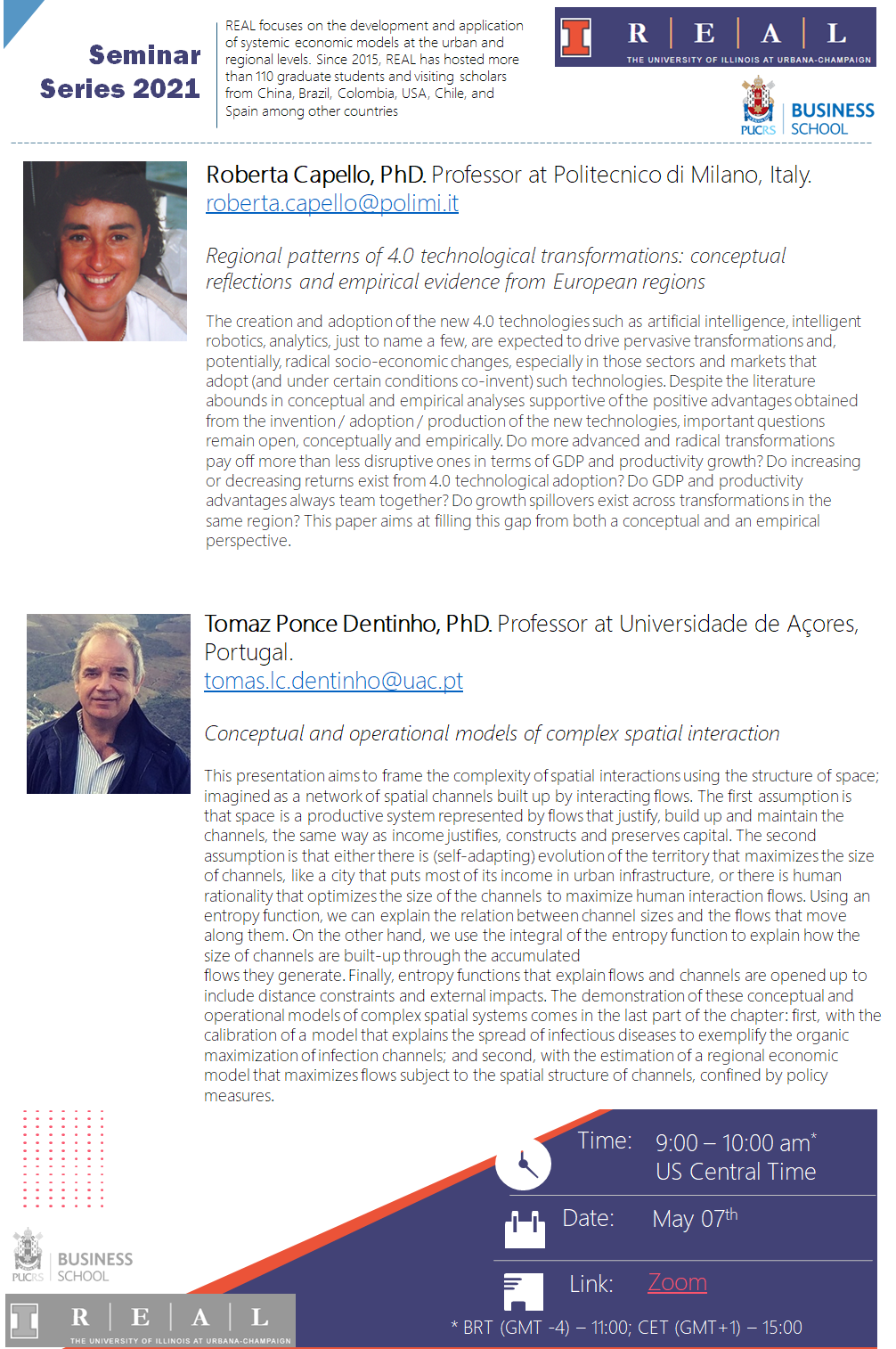ERSA Congress registration is OPEN!
|
In Memoriam: Prof. R. P. Mishra (1930–2021)
Vacancy Announcement: Rector of the United Nations University
Organizational Unit: United Nations University Centre, Tokyo, Japan
Reference Number: 2021/UNU/HQ/RO/FTA/R/79015
Applications to: Chair of the Nominating Committee
By Email: This email address is being protected from spambots. You need JavaScript enabled to view it.
Closing Date: 15 July 2021
About the Organisation:
UNU is the academic arm of the United Nations and for the last four decades has been a go-to think tank for evidence-based research on the pressing global problems of human survival, development, and welfare. Fully funded through voluntary-contributions, UNU counts over 400 researchers in 12 countries, and its work spans the full breadth of the 17 Sustainable Development Goals, generating policy-relevant knowledge to effect positive global change in furtherance of the purposes and principles of the Charter of the United Nations. UNU maintains numerous collaborations with UN agencies, leading universities, and research centres. For more information, please visit https://unu.edu
The Position:
The United Nations University (UNU) is recruiting a new Rector. The Rector is the chief academic and administrative officer of the University and has overall responsibility for the direction, organization, administration, and programmes of the University. The Rector is appointed by the Secretary-General of the United Nations after consultation with the Director-General of UNESCO. The position carries the rank of United Nations Under-Secretary-General and requires extensive overseas travel.
Required qualifications:
Advanced university degree, with strong preference for a Ph.D. The successful candidate must have a prominent academic profile with evidence of high-quality research work in the course of his/her career. In addition, he/she will demonstrate an understanding of contemporary development and policymaking challenges and will have experience translating research for policy communities. Demonstrated management experience as the head of a university or research centre is required. Fluency in English is essential.
Desirable qualifications and characteristics:
Established profile in the international community. Experience in managing donor relations and raising funds for organizations. Knowledge, appreciation of, and commitment to the principles and ideals of the United Nations. Capability to maintain close cooperation with individuals, governments, and research institutions worldwide to promote scientific cooperation. Great drive and initiative to achieve the goals of UNU. Demonstrated commitment to gender and diversity issues. Fluency in other official United Nations languages is desirable.
Start Date:
It is expected that the appointee will take up the position on 1 March 2023.
Duration of Contract:
The initial appointment will be for a five-year term, with the possibility of a second term.
Female candidates are strongly encouraged to apply for this position. UNU is committed to achieving gender balance and geographical diversity in its staff. The University has a zero-tolerance policy on sexual exploitation and abuse, sexual harassment, abuse of authority and discrimination.
Remuneration:
UNU offers an attractive package at the Under-Secretary-General level within the UN system, including an annual net salary and post adjustment, which reflects the cost of living in Tokyo. Benefits include 30 days annual leave, dependency benefits, pension plan and health insurance, and applicable additional benefits and entitlements.
Application Procedure:
Interested candidates should email their applications in English to the UNU Rectorship Nominating Committee at This email address is being protected from spambots. You need JavaScript enabled to view it. no later than 15 July 2021.
The application must contain the following supporting documents:
- a cover letter describing how the candidate’s qualifications and experience match the requirements,
- a curriculum vitae,
- a list of publications, and
- a completed and signed UNU Personal History (P.11) form, which can be downloaded at https://unu.edu/about/unu-services/hr/applying-for-a-position#files; please avoid using similar forms provided by other United Nations organisations.
Human rights screening:
Individuals who seek to serve with the United Nations in any individual capacity will be required, if short-listed, to complete a self-attestation stating that they have not committed, been convicted of, nor prosecuted for, any criminal offence and have not been involved, by act or omission, in the commission of any violation of international human rights law or international humanitarian law.
Conflicts of interest:
All United Nations staff members are expected to uphold the highest standards of efficiency, competence and integrity. Senior leaders in particular, have the responsibility to serve as role models in upholding the organization’s ethical standards. Short-listed individuals will also be required to complete the pre-appointment declaration of interests for senior positions to identify possible conflicts of interest that may arise and to proactively prevent and manage, as much as possible and in a timely manner, situations in which personal interests may conflict or appear to conflict with interests of the United Nations, should the individual be appointed to this position.
https://unu.edu/about/hr/academic/rector-under-secretary-general.html#overview
In Memoriam: Ian Masser 1937-2021
RSAI Newsletter (May 2021)
Dear RSAI members,
I hope this email finds you well.
I am writing you as the 13th World Congress just opened (yesterday) with an intense first day, packed with two excellent keynote lectures and 35 sessions, including both regular, national, and special ones. To this starter we are adding today a first dish with 40 more sessions, another much expected Keynote Speech, by Prof. Siqi Zheng (MIT), and a full day of Regional Science Avademy activities. I hope those of you who decided to join the congress will have as much interest in these events as I personally had throughout yesterday.
I am also happy to take the chance to send you the May 2021 issue of the RSAI newsletter (download), as usual skillfully edited by Prof. Martijn Smit (University of Utrecht). Martijn is seeking a second pair of eyes to help with both the gathering of contributions, and the proofreading of the final product. Applications from the global South or from those with a good range of contacts there would be particularly welcome, as would being a native speaker of English. Please contact Martijn at This email address is being protected from spambots. You need JavaScript enabled to view it. within Friday 23 July 2021 if you’re interested, enclosing a CV and a half-page statement of purpose, indicating why you feel you’re a good fit for editing the newsletter and how involved you have been and plan to be in RSAI and its activities.
To all members, a very fine day; and to the World Congress participants, best wishes of an interesting day, with lots of learning and interactions.
Kind regards,
Andrea Caragliu
Associate Professor of Regional and Urban Economics
Politecnico di Milano, ABC Department
RSAI Executive Director
New issue published - Revista Portuguesa de Estudos Regionais: 58 (2021)
It is a pleasure to inform you that the issue n. 58 (May 2021) of the journal Revista Portuguesa de Estudos Regionais / Portuguese Review of Regional Studies is now available online. You can accede to it using the following link:
http://www.apdr.pt/siteRPER/EN/revistaEN.html
Articles
The Recreational Value of Azibo Beaches: A Case Study in the Interior North of Portugal
João Oliveira Soares, Filipa Coutinho Soares
The Implementation of an Online Ticket Platform as a Cultural Management Strategy
Cidália Oliveira, Gonçalo Vieira Castro, Carmem Leal, Rui Silva
Dimensões da Universidade Empreendedora e o Seu Papel na Perceção de Competitividade Regional
Gonçalo Rodrigues Brás, Miguel Torres Preto, Ana Dias Daniel, Aurora Amélia Castro Teixeira
Impacto Económico do Instituto Politécnico de Setúbal na Região
Pedro Miguel de Jesus Calado Dominguinhos, Sandra Cristina Dias Nunes, Sandrina Berthault Moreira, Raquel Ferreira Pereira
Dificuldades da Gestão Urbana Integrada: O Caso do Parque das Nações na Perspetiva dos Utilizadores
Rita Ferreira Domingues, Paulo Castro Seixas, Ricardo Cunha Dias
O Contributo da Lei de Cotas na Redução das Desigualdades Sociais
Fernando Gonçalves, Susana Bernardino
O Estado da Bahia na Recessão: Uma Análise Shift-Share Multifatorial dos Municípios Entre 2014 e 2017
Thiago Henrique Carneiro Rios Lopes, Luiz Carlos de Santana Ribeiro
The North of Portugal and Galicia: Evidence of Agglomeration of Economic Activity
Vítor João Pereira Domingues Martinho, Jesyca Salgado Barandela
Call for papers -Extended Deadline: 17th PRSCO Summer Institute
Call for papers - extended deadline
The 17th PRSCO Summer Institute
Online meeting, 11-13 August 2021, hosted by RMIT University Vietnam
https://www.rmit.edu.vn/17th-prsco-summer-institute
The deadline for full paper submission is extended by 21 June 2021.
Please find an attached file.
Best regards,
Hiroyuki Shibusawa
PRSCO Executive Secretary
ERSA Monthly E-news - April 2021
|
Upcoming REAL-PUCRS Seminar (Friday, May 07th at 9:00 am US Central Time)

The access link to the Zoom Room is: https://pucrs.zoom.us/j/99715232314?pwd=YndEaU53WTNwcFFhVEV6VGtIVEhlQT09
Call for abstracts: Online conference, Financing Urban Resilience through Land Value Capture, 9 July 2021
Call for abstracts: Financing Urban Resilience through Land Value Capture
We invite abstract submissions for the IHS Financing Urban Resilience through Land Value Capture Conference. IHS invites you to review the collection of themes below and submit your abstract to your preferred theme. Any contribution is welcome, including abstracts of case studies, research, or opinion pieces.
Submission details should include:
- Title of the theme the abstract is submitted to
- Parallel session (1 or 2) the abstract is submitted to
- Title of the abstract
- Name(s) and affiliation(s)
- Contact details of the presenter
- Abstract of max. 200 words
- List of max. 5 keywords
Important! Abstracts should be submitted by 15th May 2021, in English. Please submit your abstract to Ms. Francesca Vanelli (This email address is being protected from spambots. You need JavaScript enabled to view it.).
IHS will review all submissions and will notify on acceptance of abstracts by the end of May. Please note that the conference will be hosted online.
More details at: https://www.ihs.nl/en/news/call-abstracts-financing-urban-resilience-through-land-value-capture
About Us
The Regional Science Association International (RSAI), founded in 1954, is an international community of scholars interested in the regional impacts of national or global processes of economic and social change.



 Start networking with fellow participants from around the world on twitter
Start networking with fellow participants from around the world on twitter 































